新概念第二册第9课-教案
- 格式:doc
- 大小:34.00 KB
- 文档页数:3
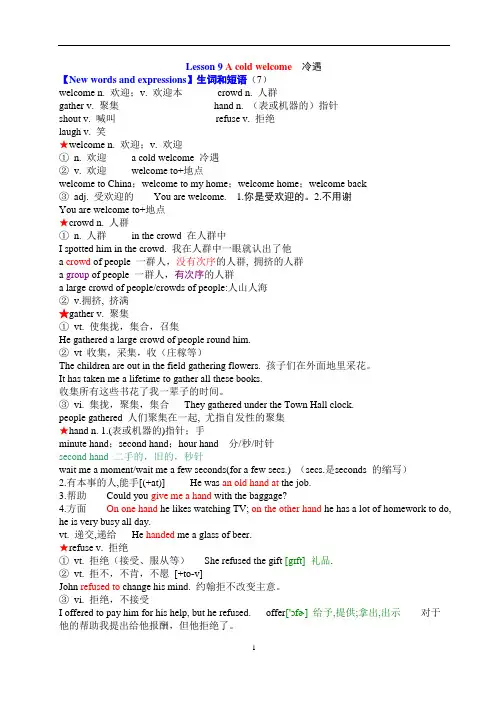
Lesson 9 A cold welcome 冷遇【New words and expressions】生词和短语(7)welcome n. 欢迎;v. 欢迎本crowd n. 人群gather v. 聚集hand n. (表或机器的)指针shout v. 喊叫refuse v. 拒绝laugh v. 笑★welcome n. 欢迎;v. 欢迎①n. 欢迎 a cold welcome 冷遇②v. 欢迎welcome to+地点welcome to China;welcome to my home;welcome home;welcome back③adj. 受欢迎的You are welcome. 1.你是受欢迎的。
2.不用谢You are welcome to+地点★crowd n. 人群①n. 人群in the crowd 在人群中I spotted him in the crowd. 我在人群中一眼就认出了他a crowd of people 一群人,没有次序的人群, 拥挤的人群a group of people 一群人,有次序的人群a large crowd of people/crowds of people:人山人海②v.拥挤, 挤满★gather v. 聚集①vt. 使集拢,集合,召集He gathered a large crowd of people round him.②vt 收集,采集,收(庄稼等)The children are out in the field gathering flowers. 孩子们在外面地里采花。
It has taken me a lifetime to gather all these books.收集所有这些书花了我一辈子的时间。
③vi. 集拢,聚集,集合They gathered under the Town Hall clock.people gathered 人们聚集在一起, 尤指自发性的聚集★hand n. 1.(表或机器的)指针;手minute hand;second hand;hour hand 分/秒/时针second hand 二手的,旧的,秒针wait me a moment/wait me a few seconds(for a few secs.) (secs.是seconds 的缩写)2.有本事的人,能手[(+at)] He was an old hand at the job.3.帮助Could you give me a hand with the baggage?4.方面On one hand he likes watching TV; on the other hand he has a lot of homework to do, he is very busy all day.vt. 递交,递给He handed me a glass of beer.★refuse v. 拒绝①vt. 拒绝(接受、服从等)She refused the gift [gɪft]礼品.②vt. 拒不,不肯,不愿[+to-v]John refused to change his mind. 约翰拒不改变主意。
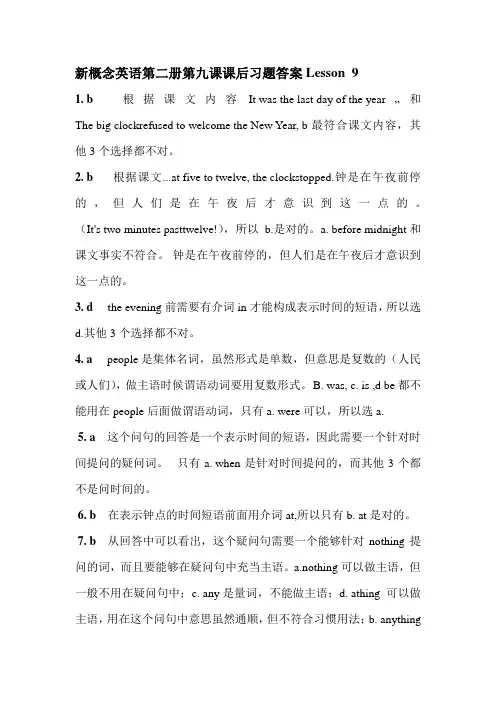
新概念英语第二册第九课课后习题答案Lesson 91. b 根据课文内容 It was the last day of the year…和The big clockrefused to welcome the New Year, b 最符合课文内容,其他3个选择都不对。
2. b根据课文...at five to twelve, the clockstopped.钟是在午夜前停的,但人们是在午夜后才意识到这一点的。
(It's two minutes pasttwelve!),所以 b.是对的。
a. before midnight 和课文事实不符合。
钟是在午夜前停的,但人们是在午夜后才意识到这一点的。
3. d the evening 前需要有介词in才能构成表示时间的短语,所以选d.其他3个选择都不对。
4. a people 是集体名词,虽然形式是单数,但意思是复数的(人民或人们),做主语时候谓语动词要用复数形式。
B. was, c. is ,d be 都不能用在people 后面做谓语动词,只有a. were 可以,所以选a.5. a 这个问句的回答是一个表示时间的短语,因此需要一个针对时间提问的疑问词。
只有a. when是针对时间提问的,而其他3个都不是问时间的。
6. b在表示钟点的时间短语前面用介词at,所以只有b. at 是对的。
7. b从回答中可以看出,这个疑问句需要一个能够针对nothing提问的词,而且要能够在疑问句中充当主语。
a.nothing可以做主语,但一般不用在疑问句中;c. any 是量词,不能做主语;d. athing可以做主语,用在这个问句中意思虽然通顺,但不符合习惯用法;b. anything是不定代词,可以做主语,而且只能在疑问句中做主语,所以b.是对的。
8. d a. hit , b. beat, c. knock , d. strike这几个动词中都有“敲”,“打”,“击”的意思,但是只有strike 有“(钟表)敲鸣”,“报时”的含义,所以最佳选择是d.9. b 本句表示钟点的短"几点过几分"中只能用介词past,所以只有b. past 是正确的答案。
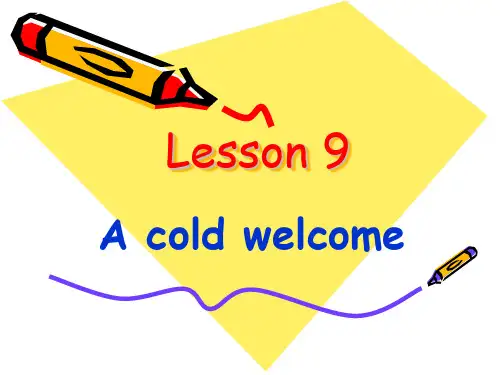
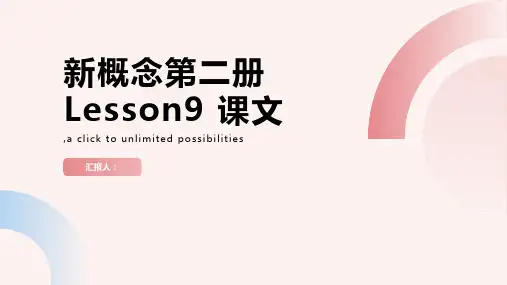
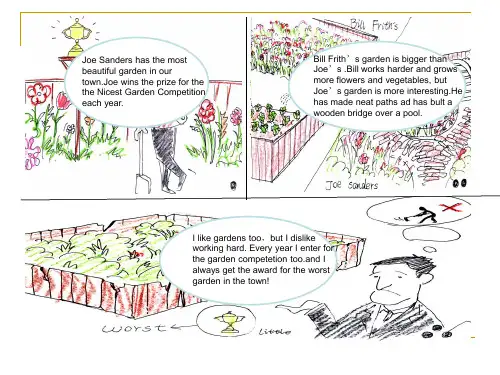

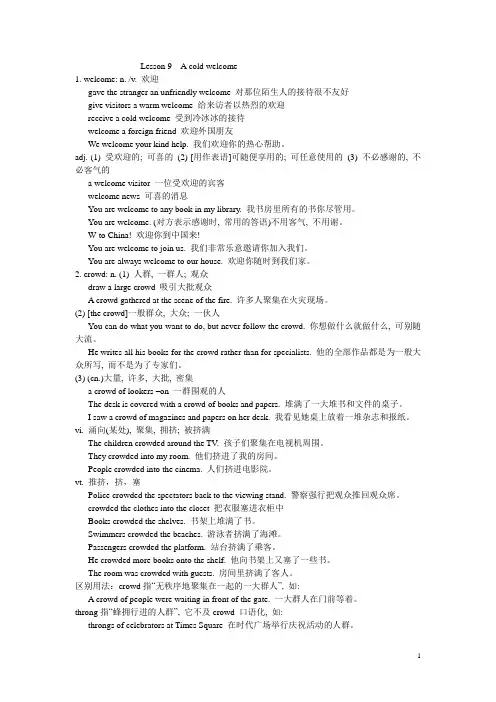
Lesson 9 A cold welcome1. welcome: n. /v. 欢迎gave the stranger an unfriendly welcome 对那位陌生人的接待很不友好give visitors a warm welcome 给来访者以热烈的欢迎receive a cold welcome 受到冷冰冰的接待welcome a foreign friend 欢迎外国朋友We welcome your kind help. 我们欢迎你的热心帮助。
adj. (1) 受欢迎的; 可喜的(2) [用作表语]可随便享用的; 可任意使用的(3) 不必感谢的, 不必客气的a welcome visitor 一位受欢迎的宾客welcome news 可喜的消息You are welcome to any book in my library. 我书房里所有的书你尽管用。
You are welcome. (对方表示感谢时, 常用的答语)不用客气, 不用谢。
W-to China! 欢迎你到中国来!You are welcome to join us. 我们非常乐意邀请你加入我们。
You are always welcome to our house. 欢迎你随时到我们家。
2. crowd: n. (1) 人群, 一群人; 观众draw a large crowd 吸引大批观众A crowd gathered at the scene of the fire. 许多人聚集在火灾现场。
(2) [the crowd]一般群众, 大众; 一伙人You can do what you want to do, but never follow the crowd. 你想做什么就做什么, 可别随大流。
He writes all his books for the crowd rather than for specialists. 他的全部作品都是为一般大众所写, 而不是为了专家们。
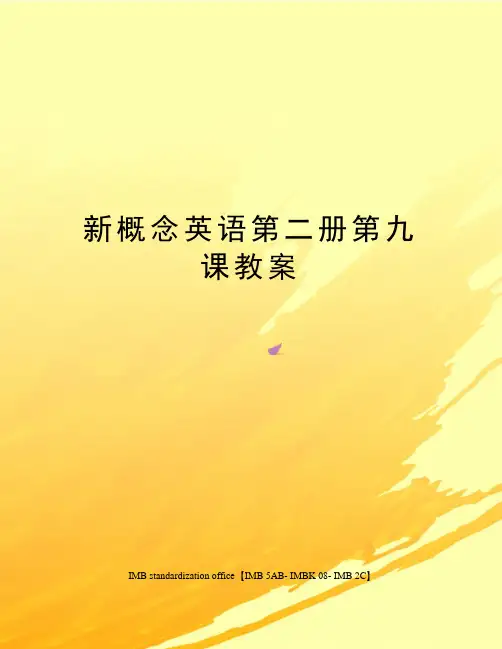
新概念英语第二册第九课教案IMB standardization office【IMB 5AB- IMBK 08- IMB 2C】L e s s o n9A c o l d w e l c o m e 1. welcome: n. /v. 欢迎gave the stranger an unfriendly welcome 对那位陌生人的接待很不友好give visitors a warm welcome 给来访者以热烈的欢迎receive a cold welcome 受到冷冰冰的接待welcome a foreign friend 欢迎外国朋友We welcome your kind help. 我们欢迎你的热心帮助。
adj. (1) 受欢迎的; 可喜的 (2) [用作表语]可随便享用的; 可任意使用的 (3) 不必感谢的, 不必客气的a welcome visitor 一位受欢迎的宾客welcome news 可喜的消息You are welcome to any book in my library. 我书房里所有的书你尽管用。
You are welcome. (对方表示感谢时, 常用的答语)不用客气, 不用谢。
W-to China! 欢迎你到中国来!You are welcome to join us. 我们非常乐意邀请你加入我们。
You are always welcome to our house. 欢迎你随时到我们家。
2. crowd: n. (1) 人群, 一群人; 观众draw a large crowd 吸引大批观众A crowd gathered at the scene of the fire. 许多人聚集在火灾现场。
(2) [the crowd]一般群众, 大众; 一伙人You can do what you want to do, but never follow the crowd. 你想做什么就做什么, 可别随大流。
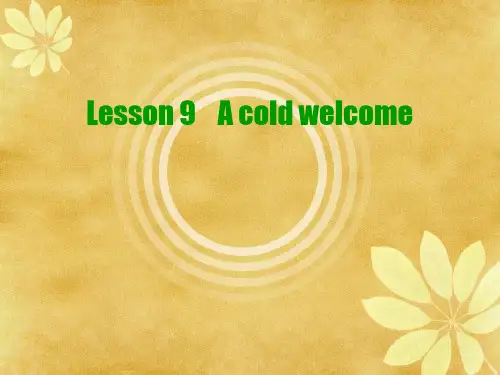
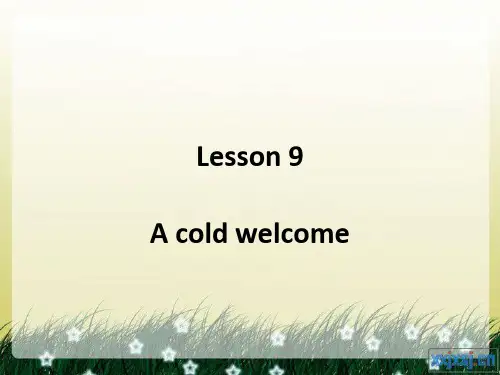
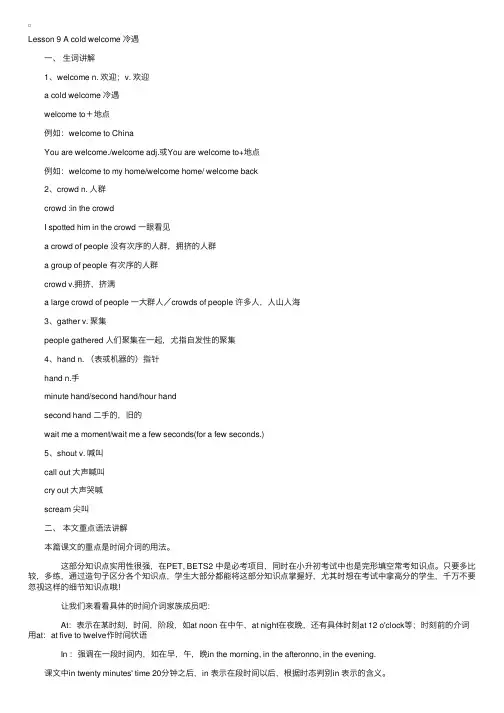
Lesson 9 A cold welcome 冷遇 ⼀、⽣词讲解 1、welcome n. 欢迎;v. 欢迎 a cold welcome 冷遇 welcome to+地点 例如:welcome to China You are welcome./welcome adj.或You are welcome to+地点 例如:welcome to my home/welcome home/ welcome back 2、crowd n. ⼈群 crowd :in the crowd I spotted him in the crowd ⼀眼看见 a crowd of people 没有次序的⼈群,拥挤的⼈群 a group of people 有次序的⼈群 crowd v.拥挤,挤满 a large crowd of people ⼀⼤群⼈/crowds of people 许多⼈,⼈⼭⼈海 3、gather v. 聚集 people gathered ⼈们聚集在⼀起,尤指⾃发性的聚集 4、hand n. (表或机器的)指针 hand n.⼿ minute hand/second hand/hour hand second hand ⼆⼿的,旧的 wait me a moment/wait me a few seconds(for a few seconds.) 5、shout v. 喊叫 call out ⼤声喊叫 cry out ⼤声哭喊 scream 尖叫 ⼆、本⽂重点语法讲解 本篇课⽂的重点是时间介词的⽤法。
这部分知识点实⽤性很强,在PET, BETS2 中是必考项⽬,同时在⼩升初考试中也是完形填空常考知识点。
只要多⽐较,多练,通过造句⼦区分各个知识点,学⽣⼤部分都能将这部分知识点掌握好,尤其时想在考试中拿⾼分的学⽣,千万不要忽视这样的细节知识点哦! 让我们来看看具体的时间介词家族成员吧: At:表⽰在某时刻,时间,阶段,如at noon 在中午,at night在夜晚,还有具体时刻at 12 o'clock等;时刻前的介词⽤at:at five to twelve作时间状语 In :强调在⼀段时间内,如在早,午,晚in the morning, in the afteronno, in the evening. 课⽂中in twenty minutes' time 20分钟之后,in 表⽰在段时间以后,根据时态判别in 表⽰的含义。
新概念英语第二册第九课课后习题答案Lesson 91. b 根据课文内容 It was the last day of the year…和The big clockrefused to welcome the New Year, b 最符合课文内容,其他3个选择都不对。
2. b根据课文...at five to twelve, the clockstopped。
钟是在午夜前停的,但人们是在午夜后才意识到这一点的.(It’s two minutes pasttwelve!),所以b.是对的。
a。
before midnight 和课文事实不符合。
钟是在午夜前停的,但人们是在午夜后才意识到这一点的。
3. d the evening 前需要有介词in才能构成表示时间的短语,所以选d。
其他3个选择都不对。
4。
a people 是集体名词,虽然形式是单数,但意思是复数的(人民或人们),做主语时候谓语动词要用复数形式。
B. was, c。
is ,d be 都不能用在people 后面做谓语动词,只有a。
were 可以,所以选a。
5. a 这个问句的回答是一个表示时间的短语,因此需要一个针对时间提问的疑问词。
只有a。
when是针对时间提问的,而其他3个都不是问时间的.6。
b在表示钟点的时间短语前面用介词at,所以只有b。
at 是对的。
7. b从回答中可以看出,这个疑问句需要一个能够针对nothing提问的词,而且要能够在疑问句中充当主语.a。
nothing可以做主语,但一般不用在疑问句中;c. any 是量词,不能做主语;d. athing可以做主语,用在这个问句中意思虽然通顺,但不符合习惯用法;b。
anything是不定代词,可以做主语,而且只能在疑问句中做主语,所以b.是对的。
8。
d a。
hit , b. beat, c. knock , d。
strike这几个动词中都有“敲",“打”,“击”的意思,但是只有strike 有“(钟表)敲鸣”,“报时”的含义,所以最佳选择是d。
Lesson 9 A cold welcome一、词汇精选:1.gather. 聚集It has taken me a lifetime to gather all these books. 收集They gathered under the Town Hall clock. 聚集在市政厅had gathered为过去完成时,表示过去某个时刻之前已经完成的动作。
After he had finished playing basketball, he came back home.2.It would strike twelve in twenty minutes' time. 再过20分钟,大钟将敲响12下。
(1)这句话的时态为过去将来时。
(2)in+表示时间长度的短语可译为“……时间之后”,一般与将来时连用:Please wait a moment here. Jack will be back in a few minutes.(3)strike的基本含义是“打”、“击”:She struck the man in the face.她打了那人的脸。
当用于钟、乐器等东西时,它有“敲”、“弹”的含义:When I entered the room, the clock struck five. 我进屋时,钟敲响了5点。
3.pass vi. 通过As she passed the library, he saw Jim.vt. Twenty minutes passed, but nothing happened.past prep. 在…之后It is two minutes past eight. We will arrive at half past ten.to 到It is two minutes to eight. It is two two two.4.refuse to do 拒绝去做某事I refused to accept the invitation.She refused the gift. Mary refused to tell her age.John refused to change his mind.5. hand n.手second hand 二手的,旧的hand n. (表或机器的)指针The big minute hand did not move.minute hand 分针minute hand/second hand/hour hand6. shout v. 喊叫scream尖叫call out 大声喊叫cry out 大声哭喊7. at that moment. at the moment = now8. a cold welcome 冷遇cold fish 冷漠的人lucky dog幸运的人welcome to China welcome to my home/ welcome Home/ welcome back9. crowd n. 人群person 指特定的人people 某群人crowd : In the crowdI spotted him in the crowd 一眼看见 a crowd of people 没有次序的人群,拥挤的人群a group of people 有次序的人群a large crowd of people 一大群人/crowds of people 许多人,人山人海10.gather v. 聚集people gathered 人们聚集在一起,尤指自发性的聚集1. 一大群人聚集在学校门口。
Lesson 9
Topics for discussion
1 What did you do to celebrate the last New Year?
2 What other important days are there in the year? How do you celebrate them?
3 Have you, or a friend, ever been late because your watch had stopped? Tell us about it.
1 Introduce the story
Today we'll listen to a story about the last evening of the year in a small 2 Understand the situation
T:What do you think is happening in the picture?
3 Listening objective.What does 'A Cold Welcome' refer to?
4 read the story
5 Answer The clock did not strike at twelve because it had stopped.
6 Intensive reading
V oc
★welcome
①n. 欢迎 a cold welcome 冷遇
②v. 欢迎welcome to+地点
welcome to China;welcome to my home;welcome home;welcome back
③adj. 受欢迎的You are welcome. You are welcome to+地点
★crowd ①n. 人群
in the crowd 在人群中
I spotted him in the crowd. 我在人群中一眼就认出了他
a crowd of people 一群人,没有次序的人群, 拥挤的人群
a group of people 一群人,有次序的人群
②v.拥挤, 挤满 a large crowd of people 一大群人
★gather v. 聚集
①vt. 使集拢,集合,召集
He gathered a large crowd of people round him.
②vt 收集,采集,收(庄稼等)
The children are out in the field gathering flowers.
③vi. 集拢,聚集,集合
They gathered under the Town Hall clock.
people gathered 人们聚集在一起, 尤指自发性的聚集
★hand n. (表或机器的)指针;手
minute hand;second hand;hour hand
second hand 二手的,旧的,秒针
★refuse v. 拒绝
①vt. 拒绝(接受、服从等)She refused the gift.
②拒不,不肯,不愿John refused to change his mind.
★shout v. 喊叫
call out 大声喊叫
cry out 大声哭喊
7 Play the tape or read the story again
Comprehension questions
1 When did you go to the Town Hall? (On Wednesday evening.)
2 What was special about Wednesday? (It was the last day of the year.)
3 Was there a large crowd? (Yes, there was.)
4 Where had everyone gathered? (Under the Town Hall clock.)
5 When would it strike twelve? (At midnight.)
6 At what time did you arrive? (11.40.)
7 When did the clock stop? (11.55.)
8 Which hand did not move? (The minute hand.)
9 Did you wait for something to happen? (Yes, we did.)
10 What did someone shout suddenly? ('It's two minutes past twelve! The clock has stopped!')
11 What did you do when you heard this? (I looked at my watch.)
12 What time did your watch say? (Two minutes past twelve.)
13 What time did the big clock say? (Five to twelve.)
14 It was already the New Year, wasn't it? (Yes, it was.)
15 What did the big clock refuse to do? (To welcome the New Year.)
16 Did everybody begin to laugh? (Yes, they did.)
Tell the story
1 Wednesday - went - Town Hall
2 last day - year - crowd - people - gathered-clock
3 strike twelve - twenty minutes'
4 Fifteen minutes - five to - stopped
5 minute hand - move
6 waited - nothing
7 Suddenly - shouted ‘two - twelve - clock-stopped’
8 looked - watch - true 9 big clock refused - Year
10 that moment - everyone - laugh - sing
★swallow v. 吞下
①v. 吞下,咽下
Tommy had swallowed the coins.
②v. 抑制,使不流露
I tried hard to swallow my doubts. 我强忍着不露出怀疑的神色。
She swallowed a smile and sat there still. 她忍住没笑,静静地坐在那里。
③v. 吞并;侵吞
Our company was swallowed up by an American company last year.
我们公司去年被一家美国公司吞并了。
Nazi Germany nearly swallowed up the whole Europe in World War II.
第二次世界大战中,纳粹德国几乎吞并了整个欧洲。
[语法]
过去进行时
概念:
1、在过去某个特定的时间正在进行或发生的动作。
2、当过去的一个动作发生的时候另外一个动作正在进行。
结构:
主语+ was(were)+ doing
S+ wasn’t(weren’t) +Ving
Was(Were)+S +Ving?
I was reading a book at 7 o’clock yesterday.
I wasn’t reading a book at 7 o’clock yesterday.
Were you reading a book at 7 o’clock yesterday?
What were you doing at 7 o’clock yesterday?
连接时间状语从句的词:when 当……的时候;while 当……的时候(强调两个动作的同时进行)
when和while大多数情况下可互换,当强调两个动作的同时进行和发生,只能用while。
just as 正当……
时间状语从句主句放前面,用连接词连接,时间状语从句放前面时,要用逗号隔开。
I was reading a book while my wife was working in the garden at two o’clock yesterday afternoon.
★ring v. 打电话;按铃
①v. 鸣响;发出清脆的响声
Yesterday morning, my alarm clock didn’t ring at 7 o’clock as usual.
When I was opening the from door, the telephone rang.
②v. 打电话;按铃
You said you were going to ring me last night, but you didn’t.
Somebody is ringing the doorbell.。